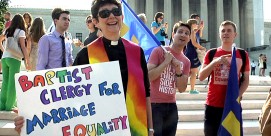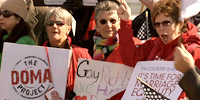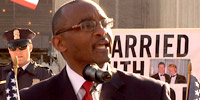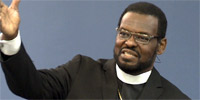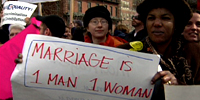BOB ABERNETHY, host: Across the nation, religious groups are analyzing the implications of last week’s Supreme Court decision on same-sex marriage. Many faith leaders are among those praising the decision as a big step toward justice and equality. But others say the decision was wrong. The Southern Baptist Convention, the US Catholic bishops and the Mormons all reaffirmed their belief that marriage can only be between a man and a woman. Several religious groups say the court’s ruling could endanger their religious liberty.
Joining me with more is our managing editor, Kim Lawton. Kim, welcome. Lots of people just feel like gay marriage is wrong.
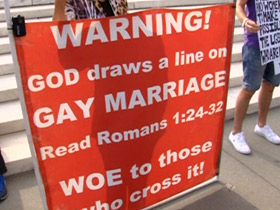
KIM LAWTON, managing editor (Follow her on Facebook, Twitter and Instagram): Well, for many it’s a deeply held religious belief. They believe God ordained marriage as uniquely between a man and a woman. They believe—they look at the Bible, and they say the Bible says homosexuality is a sin, therefore these relationships are sinful. I mean other people of faith look at the Bible differently and say those passages should be interpreted differently, but for the opponents, asking them to recognize gay marriage is tantamount to asking them to go along with something God doesn’t like, in their view.
ABERNETHY: And beyond that, there’s also a lot of concern about the possible implications on religious liberty.
LAWTON: Well, if you hold those specific religious views, how do you work those out in a public square which has a different definition of marriage and a different set of standards as to what constitutes discrimination? And even though the Supreme Court said they acknowledge that there is a First Amendment right to hold certain beliefs, how does that get worked out practically for faith-based organizations?
ABERNETHY: What are they most afraid of?
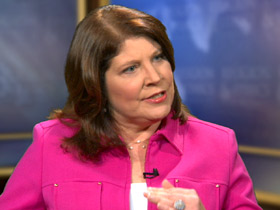
LAWTON: Well, they’re afraid of a lot of things. They’re afraid that the government will stifle their beliefs or that they’ll be penalized for holding their beliefs. So, for example, nonprofits get a tax break. They get tax exemptions. But if an organization discriminates, in the government’s view, against a certain group of people, why should the government give them tax breaks? And there have been precedents in the past where tax-exempt status has been removed from, for example, the university that had a policy banning interracial couples. So there’s that element. There’s question about hiring. Can these groups hire people who may be married or in the same-sex relationship—giving spousal benefits to people they don’t consider to be spouses? What about county clerks? Can they be opted out of certain parts of their job if they don’t want to give a marriage license to a gay couple? I mean all of those areas, businesses—must they provide services to support a gay wedding? Those cases are already in process.
ABERNETHY: I wanted to ask you—lawsuits are coming.
LAWTON: Indeed, because many supporters of gay marriage say religion should not be used to discriminate against people. Religion should not be an excuse for people not to provide services or do their jobs, but the conservative law firms are saying people have a right to stand up for what they believe, and they can’t be forced to act against what they believe. So a lot of lawsuits, a lot coming down the pike.





